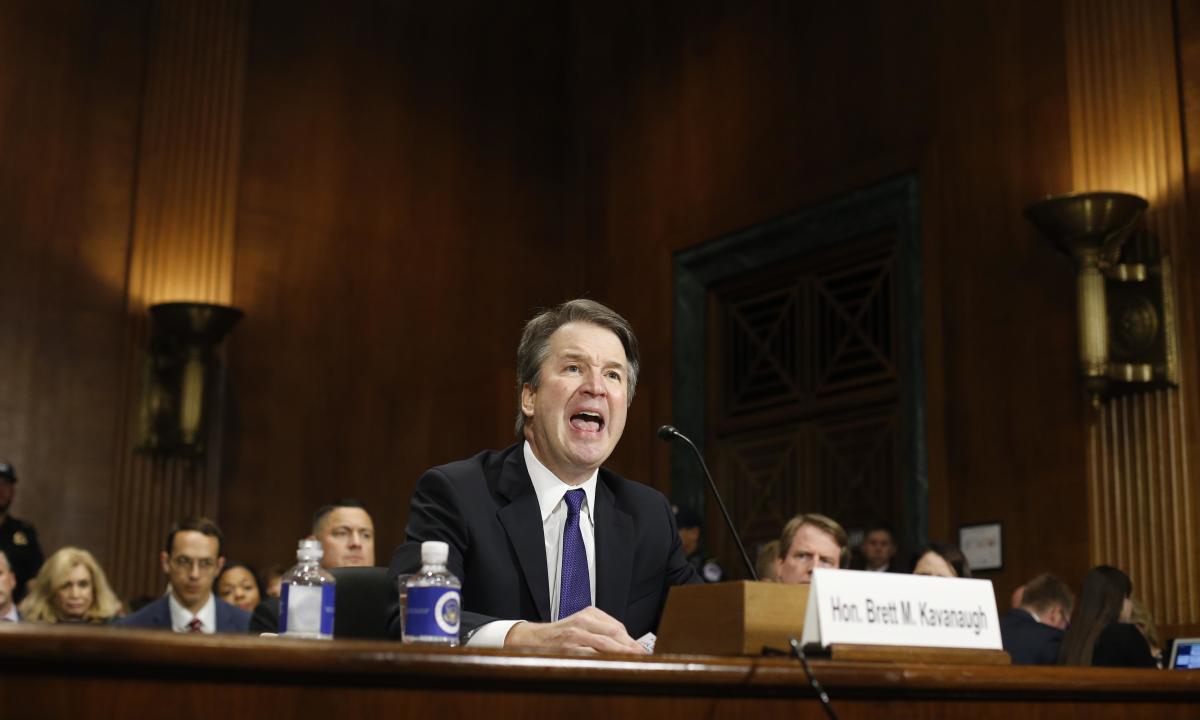Global Courant 2023-04-28 12:00:16
Photo: Michael Reynolds/EPA
A 2018 Senate investigation that found there was “no evidence” to support any of the sexual assault allegations against U.S. Supreme Court Justice Brett Kavanaugh contained serious omissions, according to new information obtained by the Guardian.
The 28-page report was released by Republican Senator Chuck Grassley, then chairman of the Senate Judiciary Committee. It prominently featured an unfounded and unverified claim that one of Kavanaugh’s accusers — a fellow Yale graduate named Deborah Ramirez — was “probably” mistaken when she claimed that Kavanaugh exposed herself to her at a dorm party because another Yale student allegedly known for such acts. .
Related: Democrats condemn Roberts’ refusal to testify in the U.S. Supreme Court’s ethics row
The suggestion that Kavanaugh was the victim of a mistaken identity was sent to the Judiciary Committee by a Colorado-based lawyer, Joseph C Smith Jr., according to an unredacted copy of a 2018 email obtained by the Guardian. Smith was a friend and former colleague of the Judiciary Committee’s lead attorney at the time, Mike Davis.
Smith was also a member of the Federalist Society, which strongly supported Kavanaugh’s Supreme Court nomination, and appears to have had a professional relationship with Federalist Society co-founder Leonard Leo, whom he thanked in the acknowledgments of his book Under God: George Washington and the Question of Church and State.
Smith wrote to Davis in the September 29, 2018 email that he was in a class behind Kavanaugh and Ramirez (who graduated in the class of 1987) and believed that Ramirez was probably mistaken in identifying Kavanaugh.
Instead, Smith said it was a classmate named Jack Maxey, who was a member of Kavanaugh’s fraternity, who allegedly had a “reputation” for exposing himself, and that he once did so at a party. To support his claim, Smith also included a photo of Maxey exposing himself in his fraternity’s 1988 yearbook photo.
Story continues
The claim that Ramirez was likely mistaken was included in the Senate Judiciary Committee’s final report, even though Maxey — who was described but not named — was not present at Yale at the time of the alleged incident.
In an interview with The Guardian, Maxey confirmed he was still a senior in high school at the time of the alleged incident and said he was never approached by any of the Republican staffers who led the investigation.
“I wasn’t at Yale,” he said. “I was in the last class of high school at the time. I wasn’t in New Haven.” He added: “These people can say whatever they want, and there are never any consequences.”
The revelation raises new questions about apparent attempts to downplay and discredit allegations of sexual misconduct by Kavanaugh and exclude evidence that supported the claims of an alleged victim.
A new documentary – of which an early version premiere at Sundance in January, but will be updated before release – includes a never-before-heard recording of another Yale graduate, Max Stier, detailing a separate alleged incident in which he said he witnessed Kavanaugh unmasking himself at a party at Yale .
It has previously reported that Taurus wanted to anonymously tell the FBI during the confirmation process that he allegedly witnessed Kavanaugh’s friends shoving the would-be judge’s penis into the hand of a female classmate at a party. Although Republicans on the Senate Judiciary Committee were reportedly notified of his desire to provide information to the FBI, he was not interviewed by the Republican investigators on the committee.
The commission’s final report claimed there was “no verifiable evidence to support” Ramirez’s claim.
It’s not clear how the movie’s director, Doug Liman, got the shot, or who Stier was talking to when it was being shot.
Taurus, the CEO of a Washington nonprofit who formerly served in the Clinton administration, declined to comment to the Guardian.
He is married to Florence Pan, a distinguished judge on the United States Court of Appeals in Washington. Pan sits in the seat vacated by U.S. Supreme Court Justice Ketanji Brown Jackson and is seen as a possible future nominee for the U.S. Supreme Court.
Maxey adamantly denied any allegation that he exposed himself to Ramirez at any point. Asked if he had ever attended Yale at the time of the alleged incident, Maxey said he had visited his older brother, Christopher, who was a senior student at Yale, on a limited number of occasions when he was a senior in high school, but that they hadn’t attended freshman parties.
Maxey, a Republican activist, has gained notoriety in conservative circles for his role in sharing a portable hard drive containing data from Hunter Biden’s laptop with members of the media, including the Washington Post. When reached by the Guardian, Maxey said he was in Europe and claimed he had “just” given the hard drive to Viktor Orbán’s government in Hungary.
Related: Ethical No Man’s Land: Can the US Supreme Court Be Trusted to Monitor Itself?
Maxey has said he got the hard drive from Rudy Giuliani. He previously worked as a researcher for Steve Bannon’s War Room podcast, but the two have been feuding ever since.
While Maxey seemed annoyed in his interview with the Guardian that Smith — who he said he didn’t know or remember interacting with — mentioned him in an accusatory email, he also separately defended Kavanaugh, whom he said he had acted like a “choirboy” while attending Yale.
Smith’s email arrived in Davis’s inbox six days after the New Yorker first published details of Ramirez’s accusation. In the article, Ramirez described how Kavanaugh allegedly exposed himself drunk at a dorm room party, shoving his penis in her face in a way that caused her to touch it without her consent in order to push it away. Ramirez, who was raised as a devout Catholic, described feeling embarrassed, humiliated and embarrassed after the alleged attack, and recalled how Kavanaugh reportedly laughed as he pulled up his pants.
Kavanaugh has denied that the incident took place.
Ramirez declined to comment through a spokesman.
Smith did not respond to several requests for comment.
It’s not clear whether Smith, a Denver-based partner at Bartlit Beck, knew or was in a relationship with Kavanaugh while or after both attended Yale as undergraduate students, or what prompted him to send Davis the email, which an obvious attempt was to make Kavanaugh suspicious.
According to his online biography, Smith attended the University of Chicago law school after graduating from Yale and—like Kavanaugh—was part of the legal team that represented George W. Bush in the 2000 Florida presidential recount.
Redacted emails show that Smith also appears to have shared his accusation about Maxey with federal investigators. While the plaintiff’s and defendant’s names were redacted, documents released by the FBI show that an individual made the exact same claim Smith made to Davis to the FBI shortly after the email was sent to Davis. In it, the person wrote, “I submitted the same information to a member of the Senate Judiciary Committee, Mike Davis, because I know him, and he suggested I submit it to you as well.”
Davis declined to comment. Republican staff on the Senate Judiciary Committee declined to respond to a request for comment.
The FBI was involved in its own review of sexual assault allegations against Kavanaugh at the time. The investigation, led by FBI Director Christopher Wray, another Yale graduate, has been widely derided as a “sham” by Democrats led by Rhode Island Senator Sheldon Whitehouse, a member of the Senate Judiciary Committee.
Whitehouse’s office is expected to issue a report late this year on the FBI’s handling of the Kavanaugh investigation.








